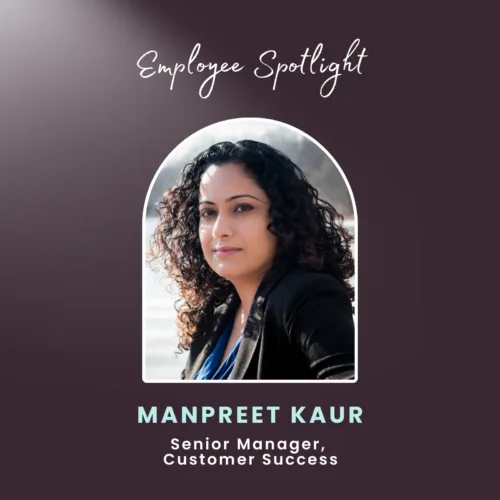Employee Spotlight: Manpreet Kaur

5 Minute Read
Manpreet Kaur, Senior Manager, Customer Success
Meet Manpreet Kaur. Her team manages customer support at Kii Health. Their goal is to provide customers with a smooth and positive experience from day one by guiding them through questions, fixing problems, and ensuring that they’re using the Kii Health platform to access programs that best support their health and wellness.
1. Can you share a bit more about what your role entails?
My role focuses on building strong relationships with clients, resolving issues quickly, and working across teams to deliver an exceptional client experience that drives engagement and retention. This includes maintaining a continuous loop of communication with our product team to ensure that client feedback is being incorporated into platform updates. My team also works closely with therapists and nurses to answer questions and give advice on programs that may help clients reach their goals. In addition, clinicians sometimes reach out to us when clients share concerns or need extra guidance, and together we make sure every client feels supported and cared for.
2. In your experience working with clients, what are some of the top challenges organizations are facing when it comes to supporting employee well-being?
A lot of companies want to help their people feel supported and healthy, but they keep running into the same roadblocks. The biggest one I see is time. Employees are busy, managers are busy, and even when a company offers great resources, people don’t always have a moment to stop and use them. The Kii Health platform helps to offset this by making support quick and easy to access from anywhere, without long processes or complicated steps. With an engineering background, I naturally look at systems through the lens of usability and efficiency. That engineer’s mindset helps me navigate technology quickly, spot solutions faster, and guide clients to the right support without delay. If it takes five steps, three logins, and a reminder of some long-forgotten password, people are less likely to try. Our platform avoids that. It is simple, intuitive, easy to use, and supported by an excellent team of clinical staff. And if an issue does come up, my team is here to resolve problems and help clients connect to the most relevant services quickly and without frustration.
Finally, companies struggle with measuring what’s working. You can launch and promote programs all day, but if you don’t track usage and feedback, it’s hard to know if you’re actually improving anyone’s well-being. At Kii Health, we measure what our clients’ main areas of feedback are through our ticketing system, and we generate weekly dashboards to track and address those trends. This feedback is also shared with leadership so that major pain points can be resolved through product improvements. These insights ensure that the platform continues to evolve in ways that meet client needs and provide the most value.
3. Why is it important for organizations to take a proactive rather than reactive approach to employee health?
When it comes to health, especially mental health, waiting until there is a crisis is like waiting for your car engine to explode before you change the oil. It costs more, it is harder to fix, and the damage is often deeper.
A proactive approach means spotting small but important signs early and stepping in before things snowball. That could be regular check-ins, easy access to resources, or tools that help people manage stress before it leads to burnout. In my work with Kii Health, I have seen how much smoother things go when support is part of everyday life instead of something you only reach for when everything is on fire.
Integrated care is a big part of that. When physical health, mental health, and workplace support work together, people do not have to jump through hoops to get help. And when the process is easy, private, and free from stigma, more people actually use it. The result is healthier employees, fewer absences, and less strain on everyone, including the company.
4. What does success look like to you in a customer relationship, and how do you help your clients get the most value out of Kii Health’s services?
Success means clients actually use Kii Health’s services and see a real difference in how their employees feel and perform. My team helps clients get the most from our comprehensive suite of health and wellness solutions by ensuring that their onboarding is smooth, employees know what’s available, and we check in regularly to address any issues. In one case, a client was referred to us, and through email exchanges with the support team, we realized that the virtual therapy program they were doing wasn’t the best fit for them and that phone support from the therapist would serve them better. So, we worked with our clinical lead and referral team to connect the employee to the right service, ensuring they didn’t wait indefinitely for the help they needed.
At the end of the day, success is when the client feels supported, employees engage with the tools easily, and everyone benefits from better health and less stress.
5. How does your team work across departments to ensure clients and their employees are getting effective, seamless support?
My team works closely with many internal groups, including product, engineering, clinical teams, and operations, to ensure everything runs smoothly for our clients. We also share feedback from clients so that we can continuously improve our services, and issues get fixed faster. It’s all about keeping communication open and breaking down silos so that clients and their employees get support that feels easy and connected, as opposed to feeling like they’re being bounced around.
6. What’s something unique about Kii Health’s approach to customer success that sets it apart in the industry?
What makes Kii Health stand out is how we treat client relationships as a true partnership, not just a service. We don’t just check the boxes and move on. We get to know our clients and their unique challenges, and we provide personalized guidance to ensure that they access the best solution to meet their needs.
We bring together clinical expertise, technology, and real human support to create solutions that fit the way people actually live and work. Plus, we keep things simple and accessible, so employees don’t feel overwhelmed or confused when reaching out for help.
I think it’s that mix of deep care, flexibility, and a focus on making things easy and accessible that really sets us apart.
7. How do you think workplace needs are evolving when it comes to health and wellness support?
When COVID hit, registrations for our company’s mental health programs surged, showing how much demand there was for accessible support. The pandemic changed the industry, making mental health a normal part of workplace wellness. Post-COVID, employees face new challenges with returning to work, adapting to hybrid schedules, and managing ongoing stress. Workplace health needs are evolving toward flexible, easy-to-use programs that address both mental and physical well-being, offering early support and quick access through technology like apps and virtual visits, so companies can provide seamless, personalized care that fits into employees’ busy lives.


